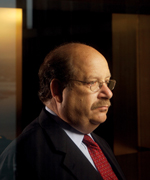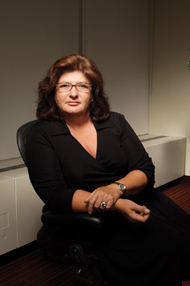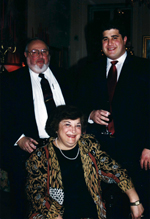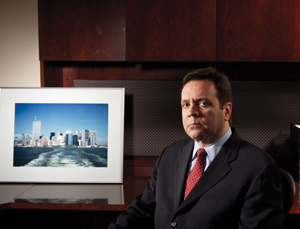Rising From The Rubble

Steven Rice
Photo by Jordan Hollender
It is a 15-minute walk from the southeast corner of ground zero across the tip of Manhattan to 100 Wall St. But it is a journey that took the New York City office of Harris Beach six years to make.
The firm’s offices in 2 World Trade Center were blown from the sky on Sept. 11, 2001, killing five employees and one contractor—the largest loss of life suffered by any law firm that day.
From his 23rd floor office, Steven J. Rice looks down Wall Street with Trinity Church in the distance and talks about the firm’s decision to return to lower Manhattan after a half-decade in midtown. It is the third week of June, the first full week in the firm’s new space. Boxes are still being unpacked, and artwork leans against hallway walls.
Rice’s office furniture is nondescript; he has no interest in duplicating the seven pieces of antique oak furniture that filled his office on the 85th floor of 2 WTC. But in a corner of the room—away from the New York Yankees memorabilia, photos of his family and brochures from his conference lectures on lead litigation—hangs a large frame. It contains an engraved plastic nameplate from his office, along with a letter and photo of the Quincy, Mass., police lieutenant who recovered the nameplate from the rubble of ground zero. It is a reminder of what was and what can be.
“When you go through something like that and survive, you learn it’s better to be lucky than good,” says Rice, the managing partner of the New York City office. He was supposed to be in the office early that morning, but ended up on a later train. His office faced south, toward the Statue of Liberty, and he guesses that the second plane sliced right through it. “It makes me want to appreciate all the good things and not waste a day.”
The move back to the new office feels right, he says, as many people in the firm started their careers downtown. He looks down Water Street and recalls his start as a young attorney in a building about 100 yards away. “I think we feel like we are back home.”
It’s not the same financial district they left six years ago. Where downtown was once a place to work and leave, newspapers and magazines now trumpet the vibrancy of a “downtown lifestyle” fueled by newly developed apartments, luxury lofts and condos. It’s also a good deal more secure. Armed security guards and metal fencing protect the entrance to the New York Stock Exchange, and NYPD Emergency Service police officers carrying M-4 automatic weapons stand in the doorway of 23 Wall St.
But if Wall Street is different, so is Harris Beach. The Sept. 11 attacks, and the memories of those who were killed, have shaped the philosophy of the New York City office.
It is no accident that the firm took space in a building on the East River side of Manhattan rather than a spot closer to the Trade Center site. It is no accident that the firm occupies space on the 22nd, 23rd and 24th floors, rather than higher floors. Dress is casual when not meeting with clients; hard work and vigorous representation are required, but obsession is not. Post-Sept. 11 improvements in technology and a paperless environment enable the attorneys to work from home. In the New York City office, some partners work flexible schedules and there are part-time attorneys.
For Rice and others, the experience changed the way they approach their profession. Preparing for trial can still involve long days and nights for weeks at a time, but when the trial is over, so are those hours. Working at home or on weekends is an exception, rather than a rule. And the word crisis has been redefined.

Cindy Antonucci
“You don’t sweat the small stuff anymore—you just move on,” says Cindy Antonucci, a litigation partner. When a burst water pipe left several inches of water in the midtown office just before the move downtown, “we said, ‘It’s only a little water.’ We’ve had to start again from nothing. After that, there’s not a hell of a lot that can upset you. That’s the biggest thing. People don’t get blown away by the little stuff. And it has to be pretty damn big for us to think of it as anything but little.” And that need to keep perspective carries over outside the office, too. “We understand the value of life,” Rice says. “We lost some very good people that day.”
They were attorneys Mark A. Brisman, Joanne F. Weil and Andrew S. Zucker, and staff members Irina Kolpakova and Sharon Millan. A sixth victim, Hector Tamayo, worked as a construction manager supervising renovations within the office.
Brisman, 34, learned he had been nominated for partner the week before the attack, and he received the honor posthumously in January 2002. Weil, 39, began working at Harris Beach shortly before Zucker, 27, who joined the firm on Aug. 1, 2001. Zucker’s widow, Erica, gave birth to their only child, Jason Andrew, five months after he was killed.
EVACUATING FLOOR 85
On the morning of Sept. 11, Harris Beach was weeks away from completing a $4 million renovation of its 48,000-square-foot space. Firm leaders called it their “acre in the sky,” and they were delivering on the promise of their brochures: “We’re expanding our services. And the view.”
Two-thirds of the floor was complete and occupied, and as the attorneys moved into their offices, they printed their names on pieces of paper with markers and taped them outside their doors. Rice knew he could do better than that, bringing in an old “Steven J. Rice” nameplate from home. New crystal glass conference room doors had been delivered and were being loaded into an elevator for installation that morning.
“We believed this was our future, this big beautiful building,” says litigation partner Abbie Fuchs. “You could see forever and we’d be there forever.”
Then the first plane hit 1 World Trade Center.
In the days after the attack, Harris Beach hired a private investigator to interview the surviving employees and try to determine what happened to the five employees who were killed. The 11-page report, submitted a month after the attack, describes a now familiar scene: the initial shock after the first plane hit, confusion and reluctance about whether to leave 2 World Trade Center, building announcements urging people to stay within the building, decisions about whether to leave by stairs or elevators, and chaos when the second plane tore through the building.
About half of the 113 people employed by Harris Beach on that day had joined the law firm in May 2000, when six partners, associates and staff moved there from Lester Schwab Katz & Dwyer. But most people didn’t arrive at the firm until well after 9 a.m., thanks to the mayoral primary election and the start of a new school year. Just 18 employees from Harris Beach and Bowne Business Solutions—which ran the mailroom—were in the office when the first airplane struck at 8:46 a.m.
Given that only 17 minutes elapsed between the two planes hitting the towers, “hesitation or delay in departing the 85th floor decreased the likelihood of safe passage out of the building,” the report says.
Immediately after the first plane hit, Zucker—who had trained for a year as a volunteer firefighter in his hometown of North Massapequa, N.Y.—recognized the threat and walked through the halls with attorney Julissa Gomez and secretary Anne Pampinella, telling people to leave the building.
Once they reached an emergency exit, Pampinella “tried to stop Andrew Zucker, but he returned to the office, apparently to make sure that Joanne Weil and Mark Brisman evacuated,” according to the report. Ultimately, the investigator could not determine whether the five Harris Beach employees were killed on the floor, on the stairs or at the express elevator landing on the 78th floor when the second plane hit at 9:03, taking out floors 77 through 85.
By hiring the investigator, “we were able to create a story for the families,” Antonucci says. “We had it available. Some of the families chose to take the report and read it. Other family members chose not to.”
ONE LAST SWEEP
In the split-level house where Andrew Zucker was raised, his father, Saul; mother, Sue; and sister, Cheryl Shames, have memorized the report and this conclusion: “Andrew Zucker was obviously concerned with everyone’s welfare on the floor, and his courageous attempts to ensure that everyone was off the floor prevented him from escaping the disaster in a timely fashion,” the report says. By leaving the group at the stairway to “conduct one last sweep of the floor for lingering occupants,” he was lost along with Brisman and Weil.

Andrew Zucker and his parents
The report provides some comfort because “at least we know Andrew was saving people,” Shames says. “His training told him that they needed to leave. Afterward, people told us that Andrew walked through the halls saying, ‘Don’t stay put. You need to get out.’ Seven people said they got out because of him.”
In a living room filled with children’s toys, and a periodic parade of Zucker’s nieces and nephew—including his 3-year-old namesake—they laugh and they cry when discussing Andrew, who even as a boy was known as “the family lawyer.”
“He was argumentative, he was verbal, he was loquacious,” Sue Zucker says. “But he had something charming about him. You couldn’t stay mad at him.”
As a member of the Benjamin N. Cardozo School of Law’s Tax Clinic, Zucker helped win a case against the Internal Revenue Service on behalf of a Pakistani immigrant that set a precedent for the interpretation of eligibility for the earned income credit. After law school, Zucker spent a year at the Bronx district attorney’s office and then practiced briefly with a firm in New Jersey before joining Harris Beach.
“He was so excited to be working in the World Trade Center,” Shames says. As a young boy, Zucker decorated his bedroom with wallpaper of the New York City skyline. “He was saying, ‘I’m working at the top of the world.’ “
It was a moment of transition for Zucker, whose wife, Erica, lost a child in the spring of 2001, several weeks before the baby was due. He considered opening his own practice before taking the job at Harris Beach, where he soon established a reputation as someone who was willing to work late and come in early.
Zucker was not supposed to be at the office that morning. He and his wife had planned to vote in the mayoral primary. But his wife was newly pregnant and had a difficult night, so he let her sleep and left for the office. They would vote later, he told her when she called that morning.
“He knew she was pregnant, but no one else knew,” Saul Zucker says. Andrew Zucker’s son was born in February 2002. Now 5, he is close to his father’s family and sees them often. Strong-willed and burly like his father, he has many of “the same mannerisms and body language,” Sue Zucker says.
Erica Zucker remarried in June, with Andrew’s family attending and Saul Zucker receiving a special honor at the ceremony. In many ways, the family feels the impact of Andrew’s death every day as they struggle to regain the close bond they once shared. Even group photos of the Zucker siblings, once an integral part of all family gatherings, stopped when Andrew was killed. A Torah scroll was dedicated in memory of Andrew Zucker in September 2006 at the Riverdale Jewish Center, the shul he attended in Riverdale, N.Y.
Within Harris Beach, the five people who didn’t make it out of the building that day are also remembered. A conference room at 100 Wall St. is dedicated to their memory: the World Trade Center Boardroom.
“All of them were valued friends and colleagues, and if they were still with us, we’d be better,” says litigation partner Brian Bender.
The Harris Beach attorneys saw their workday world disappear before their eyes—and then had the opportunity to reshape that world into something better.
After the attack, the firm spent a year at 500 Fifth Ave. before taking a five-year lease for space at 805 Third Ave., at 50th Street in midtown Manhattan. Almost immediately, those in the New York office focused on rebuilding and recovering records, files and documentation from courts, clients and other lawyers—including their adversaries.
‘WE WERE PAPERLESS’
Starting with nothing meant the firm could use technology to create a “paperless” office, without the burden of having to scan boxes of files, and that decision provided the freedom and flexibility to change other parts of the firm culture.
“We went paperless because we were paperless,” Antonucci says. The new technology helped the firm to “provide a different type of work environment that is more family-friendly. We can be professional; we can get the work done. But we can also make it to coach a son’s softball team and make it to the kid’s show.”
Or even work from home. Before Sept. 11, litigator Judi Abbott Curry used to come into the office “five days a week, every week.” Now she can work from anywhere, including home—a lifestyle change she says has been liberating.
Allowing lawyers to work flexible hours or part time recognizes that “eventually kids get older and we’d rather hold onto people we spent time training and know are good,” Curry says.
While the move back downtown energized the firm, it was a decision that was made with caution.
“When we were looking at space, people didn’t want to be in name buildings,” says Antonucci. “The feeling was, ‘You dodged the bullet once; you’re not sure you want to put another target on your back.’ “
The World Trade Center area also was not an option—nor was a tall building. “We made a conscious decision to stay away from ground zero,” says Kevin Hyland, a partner in the firm’s public finance group. “That would have brought back too many strong memories. It’s a graveyard for a lot of our colleagues. We went as far east as we could.”

Kevin Hyland
When Hyland’s clients visit the new offices, they often talk about the World Trade Center office. “We had a couple of closings last week and people said, ‘You’re not as high up.’ But I feel a little bit safer. The view is not as spectacular, but I can see the ground from here. Should anything ever happen, you can always run down 24 flights very quickly.”
The close-knit group of attorneys, many of whom have been colleagues for more than 20 years, closed ranks following the attack. “We’ve grown closer; our practices are more solidified,” Fuchs says. “We’re focused to grow past this and continue into the future. When we were in the World Trade Center, we said we could see forever. We can still see forever.”
The presence of new colleagues has helped the firm move forward, Bender says. Their energy, he says, “really helped the healing process. It pulled you up and gave you the energy you might not have had otherwise.”
In his own practice as a litigator, Bender says he quickly grows weary when his adversaries pick a ridiculous battle. “I realize not everyone went through what we did on Sept. 11, but let’s save our energy for the big ones. It’s not bitterness; it’s not anger, but I don’t rise to every challenge. I find petty battles tiresome. I might let it go, or I might not let it go. But I’ll view my adversaries differently and might lose respect for them,” he says.
SETTLING IN
As Harris Beach settles into its new space, its lawyers are rediscovering the winding cobblestone streets, the outdoor cafes of lower Manhattan and the views of the Brooklyn Bridge. But many still keep tokens of their World Trade Center days.
Fuchs carries her World Trade Center identification card, the entry card for the 85th floor and her old business cards. Curry framed an announcement of the firm’s move to the World Trade Center. Hyland has a framed photo of the Twin Towers in his office that’s waiting to be hung.
And Rice has his nameplate. Immediately after the attack, rescue workers from around the world swarmed ground zero to try to find survivors and dig through the rubble. A group of police officers from Quincy, Mass., led by Lt. Tom Bolinder, worked in the area of the Marriott Hotel, which was immediately west of 2 World Trade Center. On Sept. 15, Bolinder was digging by hand when he spotted something: the twisted, faded but intact plastic nameplate that Rice had placed outside his office door.
Bolinder sent a note to Rice in the last week of September, saying, “My original intent was to return it to a family member. To my relief, I didn’t find your name on the list of missing or deceased. … I am sure God has a special plan for your life.” Rice and Bolinder, who is now retired, remain in contact with each other.
The framed nameplate is placed so that it catches the eye when you enter the room. Says Rice, “I think about it every day.”
Sidebar
A minute-by-minute chronology of the 9/11 attacks from the National Commission on Terrorist Attacks Upon the United States
A video simulation of the airplanes striking the World Trade Center, as seen from inside the buildings, prepared by researchers at Purdue University
A Flash presentation of the passengers and events on board the hijacked planes, and an interactive timeline of the attacks, prepared by prosecutors in United States v. Moussaoui.
A video of the names and faces of the victims of the 9/11 attacks (46 minutes; Flash player required), prepared by prosecutors in United States v. Moussaoui.
Dominic Bencivenga, a freelance journalist in New York City, was across the street from the World Trade Center when the towers fell.



